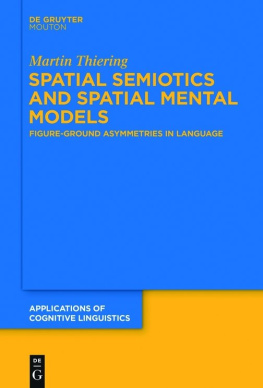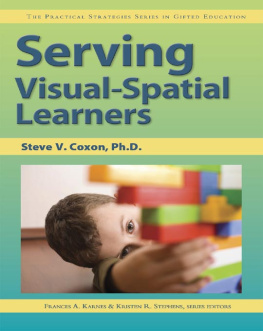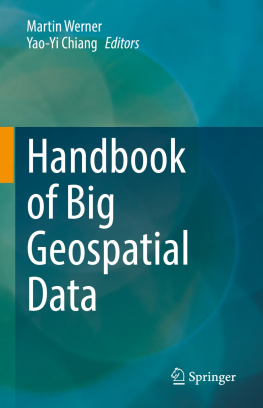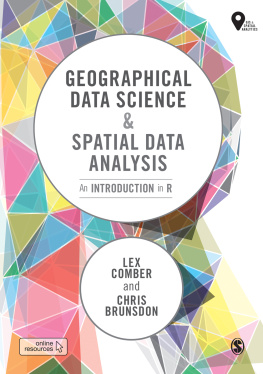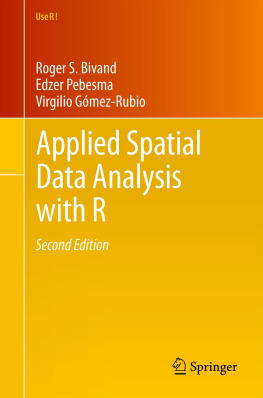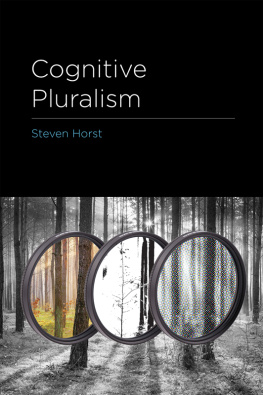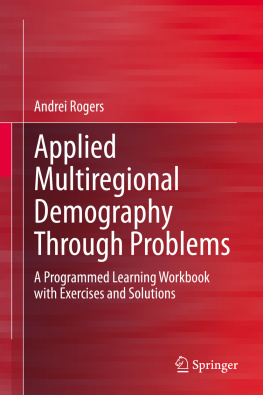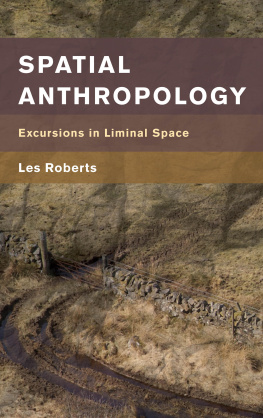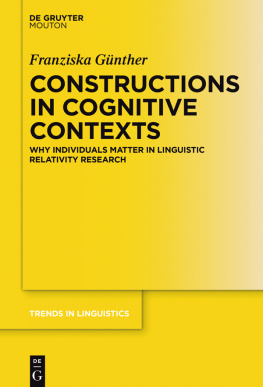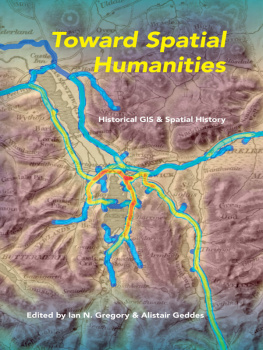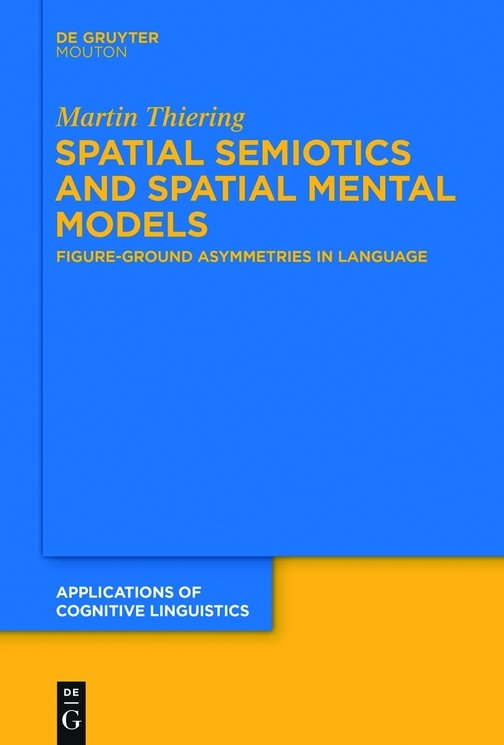Acknowledgements
cognitive semantics and related fields. The general idea of summarizing different research results in a monograph was born in 2013 at the 12th International Cognitive Linguistic Conference (ICLC) at the University of Alberta, my alma mater in Canada. First and foremost I am happy to thank Gitte Kristiansen, editor of the Applied Cognitive Linguistic series at de Gruyter Mouton, who at the ICLC invited me to submit a book proposal. De Gruyter Mouton helped with formal issues and keeping to deadlines, especially Birgit Sievert, Julie Miess and Jens Lindenhain. James Conway did an incredible job editing the whole manuscript, pointing out not only formal and stylistic issues, but also making corrections in the overall structure. The various companies who issued the previously published chapters kindly allowed revision and reuse of the respective contributions to form a new, novel and cohesive book on different spatial issues.
I would also like to thank the anonymous reviewer who synthesized the gist of the book by calling it a cultural-cognitive view of language. I could not have said it better. Thanks also to Alan Cienki and Raphael Berthele who read the initial introduction and theory chapter and provided very helpful feedback.
This book is a highly revised version of my habilitation treatise which was supervised by Monika Schwarz-Friesel at the Technical University Berlin. I am very grateful that she took up the challenge of accepting my cognitive linguistic and cognitive anthropological approach to spatial language and cognition.
Thanks also go to my former Ph.D. supervisor Sally Rice at the University of Alberta, who introduced me to the Dene language and culture a decade ago. She also introduced me to the Dene speakers of the Cold Lake community and the Daghida project which aims to revitalize the Dene language. The Cold Lake speakers have been very patient with me during the different elicitation tests they were exposed to through the years. A decade ago, too, David Beck introduced me to Upper Necaxa Totonac at the University of Alberta. I had never heard of Dene and Totonac before my arrival in Canada in 2001. Thanks for broadening my language, linguistic and cultural scope. This also applies to Wulf Schiefenhvel and Volker Heeschen who introduced me to Eipomek in my Berlin years at the Topoi Excellence Cluster The Formation and Transformation of Space and Knowledge. Their input, drawing on about 40 years of working on and with Eipo, continues to exert a tremendous influence on my work. They were also the co-supervisors of my habilitation treatise. Thank you for your support.
As a research scholar of the Topoi Excellence Cluster I worked within the Historical Epistemology of Space group at the Max Planck Institute for the History of Science (MPIWG). The institute has been vital in enabling me to considerably broaden my research scope. First and foremost I would like to thank Jrgen Renn, director of Department I, for having me at the MPIWG and providing an ideal infrastructure. Matthias Schemmel, the head of our group, and Peter Damerow () provided commentary and criticism of my narrow linguistic point of view. I would also like to thank the library staff who provided state-of-the-art service in retrieving books, papers etc. They have always been very helpful.
Over the years and countless meetings at the MPIWG I changed my research foci and started to ask different questions. Discussing these questions with my colleagues on a daily basis has always been very helpful and fruitful. Beside the academic discussions I want to thank Anna for daily trips to the Veggie Mensa. She listened to my issues and always lent an ear, and not just for academic problems. Along with music, Sascha could talk about spatial issues and philosophical problems at Berghain or Death Disco at three in the morning. Thanks to Pietro for the excellent espressi and his intellectual quibbles on space, life and everything, and to Irina who thinks that most problems are trivial (she is a mathematician and astronomer by training). All in all we were a great group of researchers coming from different research fields discussing epistemological and philosophical issues. This book profited greatly from these fruitful, interdisciplinary and sometimes stressful and seemingly endless discussions. I want to thank the office of Department I at the MPIWG, and not just for the academic atmosphere; Shadiye Leather-Barrow and Petra Schrter, especially, always had an open door, with an ear for more than just academic quibbles.
Klaus Geus from our Mental Modeling group at the Topoi Excellence Cluster has been very supportive. The C-5-1 group, specifically, had to deal with my annoying implementations of mental model theory and cognitive linguistic issues.
Special thanks to all of my students at the Department of Philosophy at the Humboldt University and the Department of Linguistics at the Technical University Berlin. Many years of teaching classes gave me the opportunity to discuss a number of research-related issues. The atmosphere in class was always very stimulating. I want to thank Sebastian, especially, for sharing not just his intellect, but also Muzak and for joining me as we dived into different tonal areas both at home and live. Sven not only participated in most of my Humboldt seminars, he also shares my taste in music.
Very personal thanks go to my old, dear friends from Hamburg: Christian, Martin, Olaf and Tim. Many nights have passed since EWS, Essotanke, KIR, and the Kaifuschwimmbad to name just a few places, instances and events.
I especially want to thank Anke and Jochen for their unwavering support on various levels. You have been very patient with me. Thank you for believing in me and keeping me going. Finally, of all the people who have been supporting me the last years and always had faith in me, I dedicate this work to Susann. Thank you so much!
Bibliography
Aitchison, Jean. 2003 [1987]. Words in the Mind: An Introduction to the Mental Lexicon . New York: Blackwell.
Allwood, Jens and Grdenfors, Peter (eds.). 1998. Cognitive Semantics: Meaning and Cognition . Philadelphia: Benjamins.
Ameka, Felix and Essegbey, James. 2006. Elements of grammar of space in Ewe. In: Stephen C. Levinson and David P. Wilkins (eds.): Grammars of Space: Explorations in Cognitive Diversity . Cambridge: Cambridge University Press, 359399.
Anderson, John R. 1983. The Architecture of Cognition . Cambridge, MA: Cambridge University Press.
Anderson, John R. 20107. Cognitive Psychology and its Implications . New York: Worth.
Arbib, Michael, Caplan, David and Marshall, John (eds.). 1982. Neural Models of Language Processes. New York: Academic Press.
Austin, John L. 1962. How to Do Things With Words . Cambridge, MA: Harvard University Press.
Baddeley, Alan D. 1990. Human Memory. Theory and Practice . Hove: Erlbaum.
Bal, Mieke. 1996. Double Exposures: The Subject of Cultural Analysis . New York/London: Routledge.
Barthes, Roland. 1981. Das Reich der Zeichen. Frankfurt am Main: Suhrkamp.
Bechtel, William and Abrahamsen, Adele. 1991. Connectionism and the Mind: An Introduction to Parallel Processing in Networks . Cambridge, MA: Blackwell.
Beck, David. 2004. Upper Necaxa Totonac . Mnchen: Lincom Europa.
Becker, Angelika. 1994. Lokalisierungsausdrcke im Sprachvergleich: eine lexi-kalisch-semantische Analyse von Lokalisierungsausdrcken im Deutschen, Englischen, Franzsischen und Trkischen . Tbingen: Niemeyer.
Beller, Sieghard, Bender, Andrea and Medin, Douglas L. 2012. Should Anthropology be part of Cognitive Science? Topics in Cognitive Science 4. 342353.

